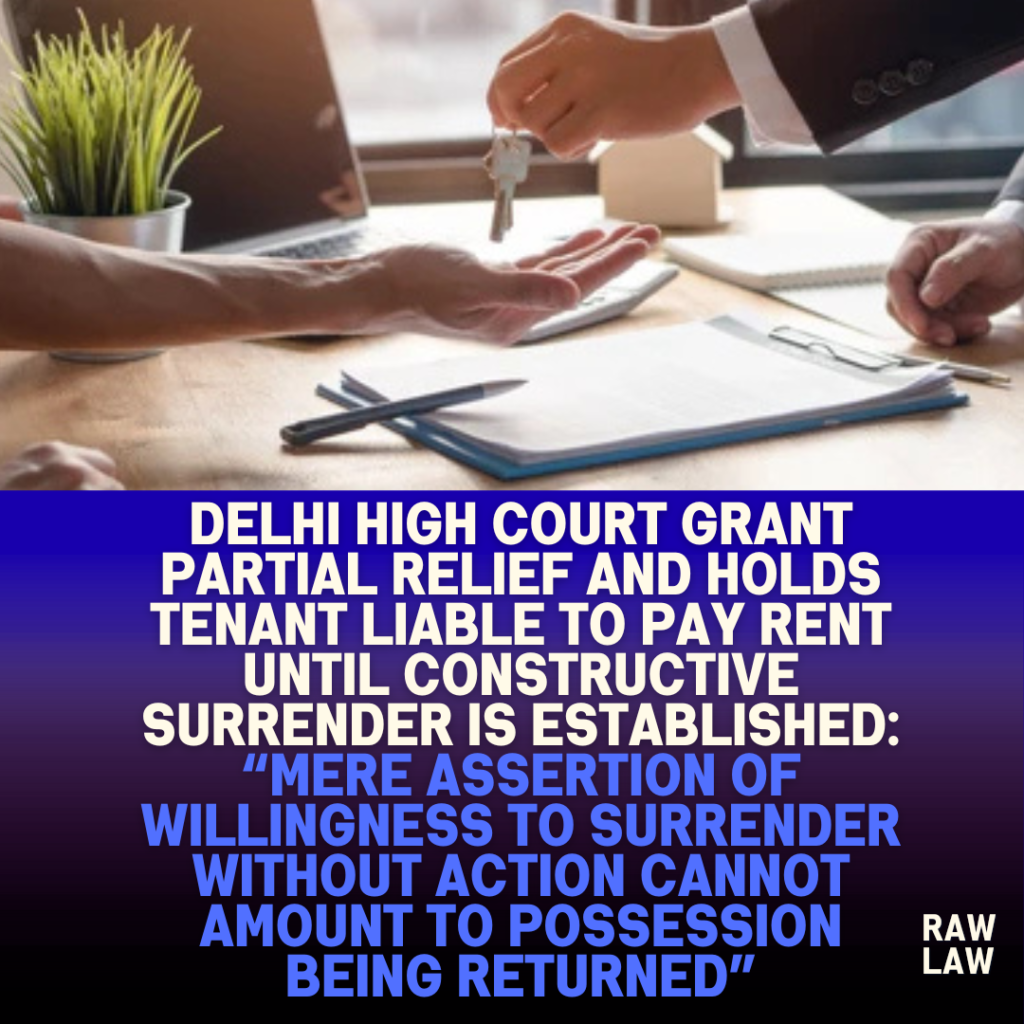Court’s Decision
The Delhi High Court allowed the appeal partially, modifying the judgment of the Commercial Court which had directed the tenant to pay rent till January 2021. The Division Bench held that the tenant’s willingness to surrender possession coupled with conduct indicated constructive surrender by December 2019, thus limiting the liability to pay rent till December 2019. The Court upheld the Commercial Court’s finding that the tenant was liable to pay ₹1,44,670 per month till December 2019, with 12% interest per annum. The contention that the suit should be dismissed for non-compliance of Section 12A of the Commercial Courts Act was rejected.
Facts
The dispute arose from a lease agreement executed in 2014 whereby the tenant took four flats on lease from the plaintiff, a senior citizen aged 84 years, for a period of nine years. The flats were leased for a commercial purpose and further sub-leased to HDFC Bank. Upon HDFC terminating its sublease in January 2019, the tenant issued notice terminating its lease and offered to hand over possession by April 2019. However, the plaintiff alleged the possession was never physically returned, and despite attempts to take over, access to the property was denied, compelling her to initiate a recovery suit.
Issues
- Whether the defendant handed over peaceful possession of the premises before January 2021 or was liable to pay rent till the actual date of possession.
- Whether the plaintiff was entitled to rent and interest, and if so, for what period and at what rate.
- Whether the suit was liable to be dismissed for non-compliance with Section 12A of the Commercial Courts Act, 2015.
Petitioner’s Arguments
The tenant argued that the lease was validly terminated and the plaintiff had been duly informed to take possession by April 2019. They contended that subsequent communications, including a reply dated 17.12.2019, reiterated their readiness to hand over possession, and thus, their liability to pay rent ceased by that date. They further argued that the suit ought to have been dismissed for non-compliance with Section 12A of the Commercial Courts Act, as there was no genuine urgent relief sought.
Respondent’s Arguments
The plaintiff asserted that physical possession was never handed over despite multiple visits and correspondence. She highlighted that no representative of the tenant was present to hand over possession in April 2019 and the premises remained locked. The plaintiff also claimed that her advanced age and urgent financial needs justified bypassing pre-institution mediation under Section 12A. It was further argued that mere willingness without actual surrender could not absolve the tenant of the obligation to pay rent till actual handover in January 2021.
Analysis of the Law
The Court analysed Section 108(q) of the Transfer of Property Act, 1882, which mandates the lessee to return possession upon lease termination. The Court noted that while refusal by a landlord to accept possession can result in constructive surrender, mere averments in pleadings without demonstrable action do not equate to surrender. The Court relied on precedents such as Onida Finance Ltd. v. Malini Khanna and Uberoisons (Machines) Ltd. v. Samtel Color Ltd., which emphasised actual steps taken to effectuate possession surrender.
Precedent Analysis
- Onida Finance Ltd. v. Malini Khanna: Established that refusal by landlord to take possession post lease termination results in constructive surrender, relieving tenant from further rent liability.
- Uberoisons (Machines) Ltd. v. Samtel Color Ltd.: Clarified that possession cannot be withheld by a tenant on account of non-refund of security deposit; rent liability continues till possession is handed over.
- H.S. Bedi v. National Highway Authority of India: Summarised key principles on tenant and landlord obligations upon lease termination.
- Patil Automation Pvt. Ltd. v. Rakheja Engineers Pvt. Ltd.: Clarified Section 12A’s mandatory pre-institution mediation requirements, but prospectively applicable from August 2022.
Court’s Reasoning
The Court observed that the tenant had issued a termination notice but did not physically hand over possession by April 2019 since the premises remained occupied by HDFC until September 2019. Thereafter, no credible evidence showed the tenant called upon the landlord to take possession. However, the Court acknowledged the reply dated 17.12.2019 and the tenant’s consistent stance, coupled with non-use of premises, as indicative of constructive surrender from that date. The Court thus concluded rent liability subsisted till December 2019.
Regarding Section 12A, the Court found that the suit, filed before the Supreme Court’s ruling in Patil Automation, was valid, especially considering the plaintiff’s age and financial urgency.
Conclusion
The Delhi High Court modified the Commercial Court’s judgment, restricting rent liability till December 2019, including 12% interest, and dismissed the claim for rent beyond that period. The suit was upheld despite non-compliance with Section 12A due to genuine urgency.
Implications
This judgment clarifies the principle that mere assertion of willingness without action is insufficient for constructive surrender of possession. However, consistent conduct reflecting no use of premises and repeated offers can establish constructive surrender. The ruling reinforces the importance of Section 108(q) compliance and draws a fine balance between landlord’s rights and tenant’s obligations post lease termination.
FAQs
1. Can a tenant stop paying rent after simply expressing readiness to vacate?
No. The Court held that a tenant must take active steps to hand over possession. Mere assertion without action does not discharge the rent liability.
2. Is pre-institution mediation compulsory in all commercial disputes?
Not in cases where urgent interim relief is sought. Moreover, suits filed prior to the Supreme Court’s 2022 ruling in Patil Automation are not barred for lack of pre-institution mediation.
3. Till when is a tenant liable to pay rent after lease termination?
A tenant is liable to pay rent until actual or constructive possession is handed back. Courts will examine not just assertions but conduct and concrete steps taken to surrender possession.



